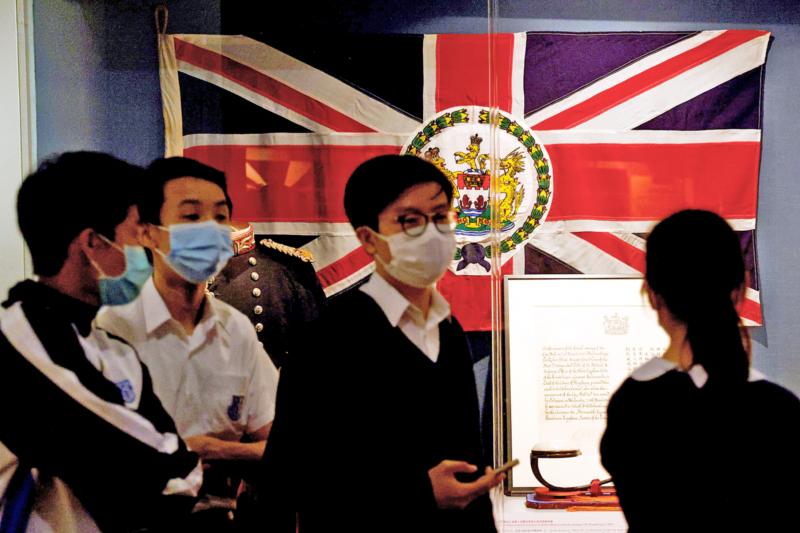Hong Kong students as young as six are to be taught about the Beijing-imposed National Security Law under a dramatic overhaul of the education curriculum.
Notices sent out on Thursday require schools to prevent participation in political activities, increase monitoring of employees and teaching materials, remove books and flyers deemed to endanger national security, and to report to authorities if necessary.
New teaching materials include an animated video featuring an owl teaching a young boy and girl about the establishment of the National Security Law and the individual offenses.

Photo: Reuters
The animation, titled Let’s Learn About National Security, which is accompanied by upbeat music and quirky sound effects, appears aimed at young children, but uses technical and legal terms.
In one clip shared online, students learn that “for the sake of Hong Kong’s continuous development and long-term prosperity, the National Security Law has been enacted,” and lists Western countries that have adopted laws to safeguard national security.
“Every one of us loves Hong Kong, our home. We all hope that our families and people around us can lead happy and stable lives,” the girl says, as images of bright skies, a playground and bustling cityscapes pop up.
The changes to the curriculum at schools in the territory are the latest move by the Chinese government to crack down on dissent, and increase control of the political leanings of Hong kongers beyond democracy advocates and opposition figures.
Last year, Hong Kong Chief Executive Carrie Lam (林鄭月娥) blamed the liberal studies curriculum for fueling the 2019 pro-democracy protests, and vowed to overhaul the education system.
A circular sent to the heads of primary and secondary schools said that article 10 of the law required the Hong Kong government to “promote national security education in schools and universities,” and a three-hour supplement on national security would be added to the current 15-hour educational module on the Chinese constitution and Hong Kong’s Basic Law.
“The fundamentals of national security education are to develop in students a sense of belonging to the country, an affection for the Chinese people, a sense of national identity, as well as an awareness of and a sense of responsibility for safeguarding national security,” it said. “It should enable students to become good citizens who have a sense of national identity, show respect for the rule of law and abide by the law.”
Another excerpt of the animation, circulated online, describes the constitutional infrastructure of the law’s creation and its promulgation, before detailing the specific offenses of secession, subversion, terrorism and collusion with a foreign country or “external elements.”
The video also displays a map of China — including Taiwan and the “nine-dash line” around the disputed South China Sea — and says that Hong Kong is “an inalienable part of our country.”
The government warned teachers that there was “no room for debate or compromise” when it came to national security, and that they should “cultivate students’ sense of responsibility to safeguard” it.
Work plans and self-compiled teaching materials must be retained for at least two years to allow for inspection by school management or the Hong Kong government.

PRECARIOUS RELATIONS: Commentators in Saudi Arabia accuse the UAE of growing too bold, backing forces at odds with Saudi interests in various conflicts A Saudi Arabian media campaign targeting the United Arab Emirates (UAE) has deepened the Gulf’s worst row in years, stoking fears of a damaging fall-out in the financial heart of the Middle East. Fiery accusations of rights abuses and betrayal have circulated for weeks in state-run and social media after a brief conflict in Yemen, where Saudi airstrikes quelled an offensive by UAE-backed separatists. The United Arab Emirates is “investing in chaos and supporting secessionists” from Libya to Yemen and the Horn of Africa, Saudi Arabia’s al-Ekhbariya TV charged in a report this week. Such invective has been unheard of

US President Donald Trump on Saturday warned Canada that if it concludes a trade deal with China, he would impose a 100 percent tariff on all goods coming over the border. Relations between the US and its northern neighbor have been rocky since Trump returned to the White House a year ago, with spats over trade and Canadian Prime Minister Mark Carney decrying a “rupture” in the US-led global order. During a visit to Beijing earlier this month, Carney hailed a “new strategic partnership” with China that resulted in a “preliminary, but landmark trade agreement” to reduce tariffs — but

SCAM CLAMPDOWN: About 130 South Korean scam suspects have been sent home since October last year, and 60 more are still waiting for repatriation Dozens of South Koreans allegedly involved in online scams in Cambodia were yesterday returned to South Korea to face investigations in what was the largest group repatriation of Korean criminal suspects from abroad. The 73 South Korean suspects allegedly scammed fellow Koreans out of 48.6 billion won (US$33 million), South Korea said. Upon arrival in South Korea’s Incheon International Airport aboard a chartered plane, the suspects — 65 men and eight women — were sent to police stations. Local TV footage showed the suspects, in handcuffs and wearing masks, being escorted by police officers and boarding buses. They were among about 260 South

Chinese President Xi Jinping’s (習近平) purge of his most senior general is driven by his effort to both secure “total control” of his military and root out corruption, US Ambassador to China David Perdue said told Bloomberg Television yesterday. The probe into Zhang Youxia (張又俠), Xi’s second-in-command, announced over the weekend, is a “major development,” Perdue said, citing the family connections the vice chair of China’s apex military commission has with Xi. Chinese authorities said Zhang was being investigated for suspected serious discipline and law violations, without disclosing further details. “I take him at his word that there’s a corruption effort under